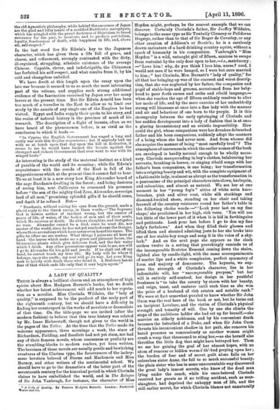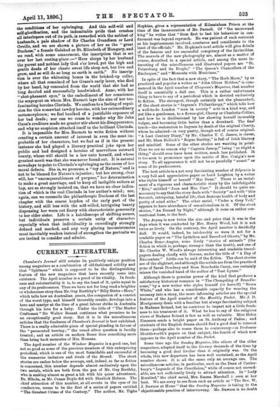A LADY OF QUALITY.*
THERE is always a brilliaut charm and an atmosphere of high spirits about Mrs. Hodgson Burnett's books, but we doubt whether her latest achievement will add much to her reputa- tion as a novelist. Miss Clorinda Wilds.irs, the "lady of quality," is supposed to be the product of the early part of the eighteenth century, but we should have a difficulty in finding her counterpart in the works of novelists or dramatists of that time. On the title-page we are invited (after the modern fashion) to believe that this true history was related by Mr. Isaac Bickerstaff, though not given to the world in the pages of the Taller. At the time that the Taller made its welcome appearance, three mornings a week, the stars of Richardson, Fielding, and Smollett had not yet risen, nor had any of their famous novels, whose coarseness or prolixity are the stumbling-blocks to modern readers, yet been written. The heroines of those novels are usually gentle and bewitching creatures of the Clarissa type, the forerunners of the lachry- mose heroines beloved of Sterne and Mackenzie and Miss Burney, and other writers of the sentimental school. We should have to go to the dramatists of the latter part of the seventeenth century for the historical period in which Clorinda claims to have embellished the world, and in The Relapse of Sir John Vanbrugh, for instance, the character of Miss • A Lsdy of Quality. By Frances Hudirson Burnett. London : Frederick Warne and Co.
Hoyden might, perhaps, be the nearest example that we can discover. Certainly Clorinda's father, Sir Jeoffry Wildairs, belongs to the same type as Sir Tenbelly Clemsey or Polidorus Hogstye, rather than to that of Sir Roger de Coverley, or any other creation of Addison's or Steele's ; he is a carelessly drawn caricature of a hard-drinking country squire, without a spark of humanity in his composition. Vanbrugh's "Miss Hoyden" is a wild, untaught girl of fifteen, anxious to escape from restraint by the only door open to her,—i.e., matrimony : —"Love him ! why, do you think I love him, nurse ? eeod, I would not care if he were hanged, so I were but once married to him ; " but Clorinda, Mrs. Burnett's "lady of quality," for all that her bringing-up was of the coarsest and worst descrip- tion, that she was neglected by her father, the companion and pupil of stable-boys and grooms, accustomed from her baby- hood to pour forth curses and oaths and ribald language,— when she reaches the age of fifteen suddenly resolves to alter her mode of life, and by the mere exercise of her undoubtedly strong will blossoms at once into a fine lady with the manner and air and behaviour of one born to the purple. It is this incongruity between the early upbringing of Clorinda and her sudden development into a lady of fashion that is at once a glaring inconsistency and an artistic impossibility. How could the girl, whose companions were her drunken debauched father and his boon companions, suddenly adopt the manners of a being whom she had never seen. And from whence did she acquire the manner of being "most carefully bred"? The atmosphere of coarseness in which the earlier scenes of the book are enveloped is hardly natural enough to be wholly neces- sary. Clorinda masquerading in boy's clothes, belabouring her servants, breaking-in horses, or singing ribald songs with her father's boon companions, is one being ; her transformation into a reigning beauty and wit, with the complete equipment of a fashionable lady, is almost as abrupt as the transformation in a pantomime of the principal characters into clown, harlequin, and columbine, and almost as natural. We see her at one moment in her "young fop's" attire of white satin knee- breeches, pink and silver coat, white silk stockings and diamond-buckled shoes, standing on her chair and taking farewell of the country roisterers round her father's table in the following choice words :—"' Look your last on my fine shape,' she proclaimed in her high, rich voioe. 'You will see but little of the lower part of it when it is hid in farthingales and petticoats. Look your last before I go to don my fine lady's furbelows: And when they filled their glasses and lifted them and shouted admiring jests to her she broke into one of her stable-boy songs and sang it in the voice of a sky- lark." And on the next page she appears as the clock strikes twelve in a setting that provokingly reminds us of the incomparable Beatrice Esmond coming down the stairs, lighted also by candle-light, with the same accompaniments of scarlet lips and a white complexion, perfect symmetry of form and majesty of demeanour. The keynote, we sup- pose the strength of Clorinda's character, lies in her indomitable will, her "unconquerable purpose," but her will is entirely self-centred, her design in her youthful freshness is "to take the county by storm with her beauty, and reign, toast, and enslaver until such time as she won the prize of a husband of rich estates and notable rank." We were at fiyA somewhat puzzled to know whether Sir John Oxon was Via real hero of the book or not, but he turns out an incipient Lovelace, and the victim of Clorinda's physical strength and tenacity of will. One by one she climbs the steps of the ambitious ladder she had set up for herself,—she marries an elderly nobleman, and by his convenient death becomes the betrothed of a Duke, and when Sir John Oxon thrusts his inconvenient shadow in her path, she removes his hated presence as remorselessly as another woman might crush a wasp that threatened to sting her,—as she herself also throttles the little dog that might have betrayed her. Then we see her gaining the goal of her utmost hopes, with no atom of remorse or hidden worm-i'-th'-bud preying upon her ; the burden of fear and of secret guilt alone falls on her colourless sister Anne, the foil to so much successful beauty, the plain sister who has in some unaccountable way discovered the great lady's inmost secrets, who knew of the dead man lying under the couch, while his once-beloved Clorinda received her guests as if no trifling accident, such as man- slaughter, had deprived the unhappy man of life, and the still earlier secret, for which Clorinda blames not unnaturally the conditions of her upbringing. And this self-will and self-glorification, and the indomitable pride that crushes all interlopers out of its path, is rewarded with the noblest of husbands, a pale shadow of Sir Charles Grandison or Lord Orville, and we are shown a picture of her as the "great Duchess," a female Galahad or St. Elizabeth of Hungary, and we read, with some amazement, the inscription that is set over her last resting-place :—" Here sleeps by her husband the purest and noblest lady God e'er loved, yet the high and gentle deeds of her chaste sweet life sleep not, but live and grow, and so will do so long as earth is earth." No inscrip- tion is over the whitening bones in the bricked-up cellar, where all that remained of her Grace's early lover, who died by her hand, lay concealed from the world that she had so long dazzled and successfully hoodwinked. Anne, with her "shot-pheasant eyes," is the embodiment of her conscience. the scapegoat on whom Mrs. Barnett lays the sins of her too. fascinating heroine Clorinda. We confess to a feeling of repul- sion for this somewhat tawdry heroine, with her extraordinary metamorphoses; we feel baulked of a justifiable exposure of her bad deeds ; nor can we cease to wonder why Sir John Oxon's creditors made no greater stir about his disappearance, and why no suspicion attached itself to the brilliant Clorinda.
It is impossible for Mrs. Burnett to write fiction without creating a certain amount of interest in even the most im- probable of her characters, but we feel as if in the present instance she had played a literary practical joke upon her public and had designed a heroine of marvellous outward beauty, whose will should be a law unto herself, and whose greatest merit was that she was never found out. It is natural nowadays to point to Clorinda's upbringing as the cause of her moral defects. She is, we presume, a "toy of Nature," and is not to be blamed for Nature's injustice ; but her strong, clear will, her " unconquerableness of purpose," her determination to make a great marriage, and to keep all ineligible suitors at bay, are so strongly insisted on, that we have no clear indica- tion of which is the real Clorinda in her author's mind ; nor, again, can we reconcile the philanthropic Duchess of the last chapter with the coarse hoyden of the early part of the history, and still less with the self-willed, intriguing beauty dispensing her worn.out finery with characteristic generosity to her elder sister. Life is a kaleidoscope of shifting scenes, but individuals preserve a certain unity of character, especially when that individuality is exceedingly strongly defined and marked, and any very glaring inconsistencies must inevitably weaken instead of strengthen the portraits we are invited to consider and admire.



































 Previous page
Previous page